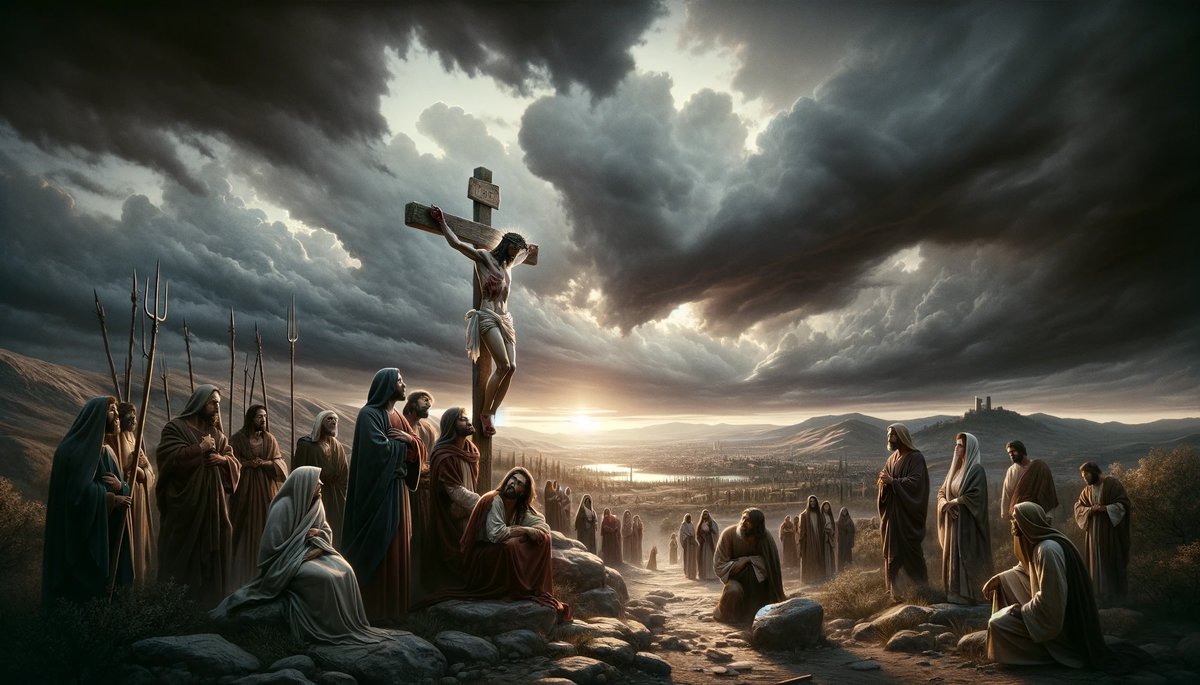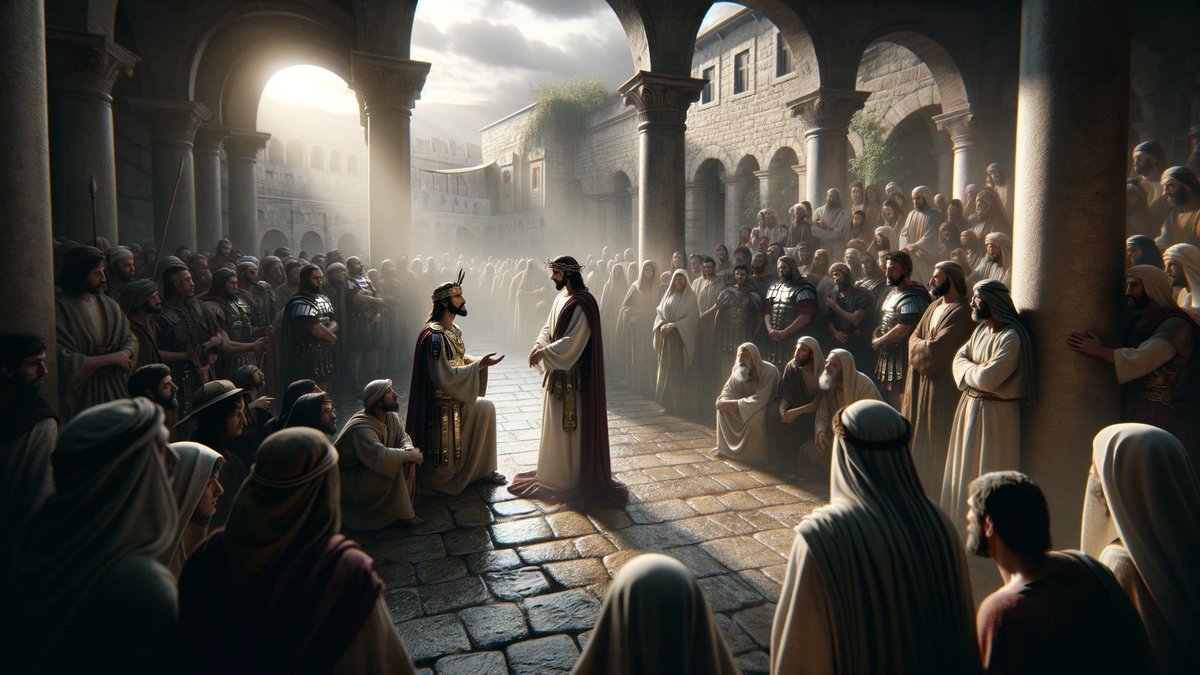Home>Theology and Spirituality>How Many Years From Jesus’ Baptism Until His Crucifixion?


Theology and Spirituality
How Many Years From Jesus’ Baptism Until His Crucifixion?
Published: February 29, 2024
Ericka Andersen, an editor at Christian.net, expertly merges digital strategy with content creation, focusing on faith and societal issues. Her communication skills enhance the platform's engaging narratives, fostering meaningful dialogue on belief's impact on society.
Discover the timeline from Jesus' baptism to his crucifixion in this insightful exploration of theology and spirituality. Uncover the profound significance of these pivotal events in Christian history.
(Many of the links in this article redirect to a specific reviewed product. Your purchase of these products through affiliate links helps to generate commission for Christian.net, at no extra cost. Learn more)
Table of Contents
Introduction
How many years passed from Jesus' baptism until his crucifixion? This question has intrigued scholars and believers for centuries. The timeline of Jesus' ministry, from the moment he was baptized by John the Baptist to his ultimate sacrifice on the cross, holds significant importance in Christian theology and history. Understanding the duration of this period provides insight into the teachings, miracles, and events that shaped the life and mission of Jesus Christ. In this article, we will delve into the key milestones of Jesus' ministry, shedding light on the years that transpired between his baptism and crucifixion.
Read more: How Old Was Jesus At His Baptism
The Ministry of Jesus
The ministry of Jesus, often referred to as his public life, marks the period when he actively engaged in teaching, performing miracles, and spreading his message of love, compassion, and salvation. This pivotal phase in Jesus' life began with his baptism by John the Baptist and continued until his crucifixion. The ministry of Jesus is characterized by his profound teachings, transformative miracles, and unwavering commitment to fulfilling his divine purpose on earth. It is a period that holds immense significance in Christian faith and serves as the foundation for the beliefs and practices of millions of followers worldwide.
During his ministry, Jesus traveled throughout the region, delivering powerful sermons that emphasized the Kingdom of God, repentance, forgiveness, and the ethical principles of love and compassion. His teachings, often conveyed through parables, challenged societal norms and offered a radical perspective on spirituality and human conduct. Jesus' ministry also witnessed numerous miraculous acts, including the healing of the sick, the feeding of the multitudes, and even raising the dead. These miracles served as tangible demonstrations of his divine authority and compassion, solidifying his role as the Son of God.
The ministry of Jesus was not confined to the walls of synagogues or temples; rather, it unfolded in the midst of everyday life, engaging with people from all walks of society. His interactions with the marginalized, the outcasts, and the sinners reflected a message of inclusivity and redemption, transcending social barriers and cultural divides. Through his ministry, Jesus exemplified a life of humility, service, and sacrificial love, inspiring his followers to emulate these virtues in their own lives.
As Jesus' ministry progressed, it garnered both devoted followers and vehement opposition. His radical teachings and claims of divine authority challenged the religious authorities of the time, leading to intense scrutiny and conflict. Despite the growing opposition, Jesus remained steadfast in his mission, unwavering in his commitment to fulfill the will of his Heavenly Father. The culmination of his ministry would ultimately lead to the profound events of his last days, including the Last Supper, his arrest, trial, and ultimately, his crucifixion.
The ministry of Jesus stands as a testament to the transformative power of faith, love, and divine purpose. It serves as a guiding light for believers, illuminating the path of compassion, justice, and spiritual awakening. The impact of Jesus' ministry reverberates through the annals of history, shaping the course of Christianity and offering timeless wisdom for those who seek to understand the essence of his teachings.
The Baptism of Jesus
The baptism of Jesus holds profound significance in Christian theology, marking the initiation of his public ministry. According to the Gospels, Jesus traveled to the Jordan River to be baptized by John the Baptist. This pivotal event symbolized not only the purification and consecration of Jesus but also the affirmation of his divine identity and mission. As Jesus emerged from the waters, the heavens opened, and the Spirit of God descended upon him in the form of a dove, while a voice from heaven proclaimed, "This is my beloved Son, in whom I am well pleased." This divine affirmation affirmed Jesus' role as the Son of God and inaugurated his earthly ministry, setting the stage for the profound teachings, miracles, and redemptive mission that would unfold in the years to come.
The baptism of Jesus also serves as a powerful example of humility and identification with humanity. Despite being sinless, Jesus chose to undergo baptism, aligning himself with the repentant hearts of those who sought spiritual renewal. This act of solidarity with humanity underscores Jesus' compassion and his willingness to enter into the human experience, sharing in the joys and struggles of humanity. The baptism of Jesus not only signified the commencement of his public ministry but also exemplified his deep empathy and solidarity with the human condition, laying the foundation for his transformative mission of redemption and reconciliation.
The baptism of Jesus carries profound spiritual symbolism, representing the cleansing of sin and the emergence into a new life. It serves as a model for believers, illustrating the significance of repentance, spiritual rebirth, and the affirmation of one's identity as a beloved child of God. The imagery of water baptism, as exemplified by Jesus' own baptism, continues to hold immense significance in Christian sacramental theology, signifying the washing away of sin and the reception of the Holy Spirit. Through his own baptism, Jesus provided a powerful example for his followers, inviting them to partake in the spiritual renewal and transformation that comes from embracing the message of the Kingdom of God.
The baptism of Jesus stands as a pivotal moment in the life of Christ, marking the commencement of his public ministry and the affirmation of his divine identity. It serves as a profound symbol of humility, solidarity with humanity, and the transformative power of spiritual rebirth. The echoes of Jesus' baptism resonate through the corridors of Christian faith, inspiring believers to embrace the call to repentance, renewal, and the fullness of life found in communion with God.
The Teachings and Miracles of Jesus
The teachings and miracles of Jesus form the cornerstone of his ministry, embodying the essence of his message and the manifestation of divine power. Throughout his public life, Jesus imparted profound wisdom and ethical principles that continue to resonate with believers across the globe. His teachings, often conveyed through parables and direct interactions, addressed fundamental aspects of human existence, morality, and the Kingdom of God. Jesus' Sermon on the Mount, a seminal discourse found in the Gospel of Matthew, encapsulates the transformative nature of his teachings, encompassing themes of humility, mercy, peacemaking, and the radical ethic of love for both neighbors and enemies.
In addition to his teachings, Jesus performed a myriad of miracles that defied the natural order and revealed his authority over creation. The Gospels recount numerous instances where Jesus healed the sick, restored sight to the blind, calmed raging storms, and even raised the dead. These miraculous acts served as tangible demonstrations of his divine power and compassion, offering hope and restoration to those in need. The miracles of Jesus not only alleviated physical suffering but also symbolized the spiritual healing and liberation that he came to bring, pointing to the arrival of God's Kingdom and the fulfillment of ancient prophecies.
The teachings and miracles of Jesus were inseparable, forming a cohesive narrative of divine revelation and redemptive action. His teachings illuminated the ethical and spiritual dimensions of the Kingdom of God, while his miracles testified to the tangible manifestation of God's power and mercy in the world. Together, they conveyed a holistic vision of restoration, transformation, and the inauguration of a new era characterized by justice, compassion, and spiritual renewal.
The impact of Jesus' teachings and miracles reverberates through the annals of history, shaping the moral conscience of humanity and inspiring countless individuals to embrace the values of love, compassion, and social justice. The enduring relevance of his teachings and the enduring fascination with his miracles attest to their timeless significance and their capacity to transcend cultural and temporal boundaries. As followers of Jesus continue to reflect on his teachings and marvel at his miracles, they are invited to embody the same spirit of compassion, faith, and transformative power that characterized his earthly ministry.
The Last Supper
The Last Supper stands as a poignant and profound moment in the life of Jesus, marking the culmination of his earthly ministry and the initiation of the events leading to his crucifixion. This iconic event, depicted in the Gospels of Matthew, Mark, and Luke, portrays Jesus sharing a final meal with his disciples before facing the impending trials and sacrifice. The Last Supper holds deep theological and sacramental significance, as it not only foreshadowed the betrayal and crucifixion of Jesus but also instituted the sacrament of the Eucharist, a central ritual in Christian worship.
During the Last Supper, Jesus gathered with his twelve disciples in an upper room in Jerusalem to observe the traditional Passover meal. Amidst the solemn atmosphere, Jesus took the opportunity to impart crucial teachings and symbols that would carry profound meaning for his followers. He initiated the act of foot washing, demonstrating a radical expression of humility and servanthood, urging his disciples to embody the same spirit of selfless love and mutual care. This act of washing the feet symbolized the essence of Christian discipleship, emphasizing the call to humble service and sacrificial love as foundational virtues of the Christian life.
The Last Supper also witnessed the pivotal moment when Jesus instituted the sacrament of the Eucharist, or Holy Communion, by sharing bread and wine with his disciples. He imparted new significance to these elements, declaring that the bread represented his body given for them, and the wine symbolized his blood shed for the forgiveness of sins. This act of sharing in the bread and wine signified a profound spiritual union with Jesus, inviting his followers to partake in the redemptive benefits of his sacrificial death and to remember his life-giving love through the communal act of sharing the Eucharistic meal.
The Last Supper was also marked by the revelation of the impending betrayal, as Jesus foretold that one of his disciples would betray him. This somber revelation underscored the depth of the emotional turmoil that Jesus experienced, knowing that one of his closest companions would betray him to the authorities. Despite this impending betrayal and the looming shadow of the cross, Jesus demonstrated unwavering resolve and a spirit of profound love, offering words of comfort and assurance to his disciples, promising the coming of the Holy Spirit and the hope of eternal communion with him.
The Last Supper serves as a poignant reminder of the depth of Jesus' love and the selfless sacrifice that characterized his mission. It encapsulates the essence of Christian discipleship, calling believers to embody the virtues of humility, servanthood, and remembrance of Christ's redemptive act. As followers of Jesus partake in the sacrament of the Eucharist, they are invited to enter into a profound communion with the living Christ, remembering his sacrificial love and embodying the transformative power of his redemptive mission.
Read more: How Many Years From Adam To Jesus Christ
The Arrest and Trial of Jesus
The arrest and trial of Jesus represent a pivotal juncture in the narrative of his earthly ministry, marking the sequence of events that ultimately led to his crucifixion. According to the Gospel accounts, Jesus faced betrayal by one of his disciples, Judas Iscariot, who identified him to the religious authorities with a kiss in the Garden of Gethsemane. This act of betrayal set in motion a series of events that would culminate in the trial and crucifixion of Jesus.
Following his arrest, Jesus was subjected to a series of trials before both Jewish and Roman authorities. The Jewish religious leaders, seeking to find grounds for condemning Jesus, convened a trial that involved false witnesses and accusations of blasphemy. Despite the lack of credible evidence, the high priest Caiaphas and the Sanhedrin found Jesus guilty of claiming to be the Son of God, a charge that carried severe implications within the religious context of the time.
Subsequently, Jesus was brought before the Roman governor, Pontius Pilate, who held the authority to pronounce a death sentence. The trial before Pilate unfolded against the backdrop of political tension and the volatile atmosphere of Jerusalem during the Passover festival. Pilate, while finding no fault in Jesus, succumbed to the pressure exerted by the religious leaders and the crowd, ultimately consenting to the crucifixion of Jesus as a means of appeasing the public unrest.
The arrest and trial of Jesus underscore the themes of injustice, betrayal, and the collision of divine purpose with human frailty. Despite the unjust proceedings and the manipulation of political and religious powers, Jesus remained resolute in fulfilling the redemptive mission entrusted to him. His unwavering commitment to sacrificial love and the forgiveness of those who orchestrated his arrest and trial exemplified the depth of his divine purpose and the transformative power of his message.
The arrest and trial of Jesus serve as a poignant reminder of the complexities of human nature and the clash between divine truth and the flawed systems of the world. The events leading to his crucifixion, while marked by injustice and betrayal, ultimately paved the way for the fulfillment of God's redemptive plan, offering hope and reconciliation to humanity. As followers of Jesus reflect on the arrest and trial, they are invited to contemplate the enduring significance of his sacrificial love and the redemptive power that emerged from the darkest moments of his earthly journey.
The Crucifixion of Jesus
The crucifixion of Jesus stands as the defining moment of his earthly mission, embodying the pinnacle of sacrificial love and the redemptive purpose for which he came. According to the Gospel accounts, Jesus was led to the hill of Golgotha, where he was crucified alongside two criminals. The crucifixion, a form of execution reserved for the most heinous criminals, entailed the agonizing process of being nailed to a wooden cross and left to suffer until death.
As Jesus hung on the cross, he endured unimaginable physical torment and excruciating pain, bearing the weight of humanity's sins and the brokenness of the world. Despite the agony, Jesus exhibited unparalleled compassion and forgiveness, offering words of mercy and reconciliation even in the midst of his suffering. His profound declaration, "Father, forgive them, for they know not what they do," encapsulated the essence of his redemptive mission, extending grace to those who orchestrated his crucifixion.
The crucifixion of Jesus was accompanied by darkness and seismic disturbances, symbolizing the cosmic significance of the event. In his final moments, Jesus cried out, "It is finished," signifying the completion of his redemptive work and the fulfillment of ancient prophecies. His sacrificial death on the cross served as the ultimate atonement for humanity's sins, reconciling humanity to God and inaugurating a new covenant of grace and forgiveness.
The crucifixion of Jesus holds profound theological and spiritual significance, representing the apex of God's love for humanity. Through his willing sacrifice, Jesus demonstrated the depth of divine compassion and the extent to which God was willing to go to reconcile humanity to Himself. The cross, once a symbol of suffering and shame, became the emblem of hope and redemption, signifying the triumph of love over sin and death.
As followers of Jesus reflect on the crucifixion, they are invited to contemplate the immeasurable love and grace displayed on the cross. The redemptive power of Jesus' sacrifice continues to resonate through the ages, offering healing, forgiveness, and the promise of eternal life to all who embrace the message of the cross. The crucifixion of Jesus remains a timeless testament to the transformative power of sacrificial love and the enduring hope it brings to a world in need of redemption.
Conclusion
The duration from Jesus' baptism to his crucifixion encompasses a period of profound significance in Christian theology and history. His ministry, marked by transformative teachings and miraculous acts, laid the foundation for the redemptive mission that culminated in the events of his arrest, trial, and ultimately, his crucifixion. The baptism of Jesus symbolized the initiation of his public ministry and the affirmation of his divine identity, while the Last Supper encapsulated the essence of sacrificial love and the institution of the Eucharist. The arrest and trial of Jesus underscored the clash between divine purpose and human frailty, while his crucifixion represented the pinnacle of redemptive love and the triumph over sin and death. As followers of Jesus reflect on the years that transpired from his baptism to his crucifixion, they are invited to embrace the enduring significance of his teachings, miracles, and ultimate sacrifice, embodying the transformative power of his redemptive mission in their own lives.














